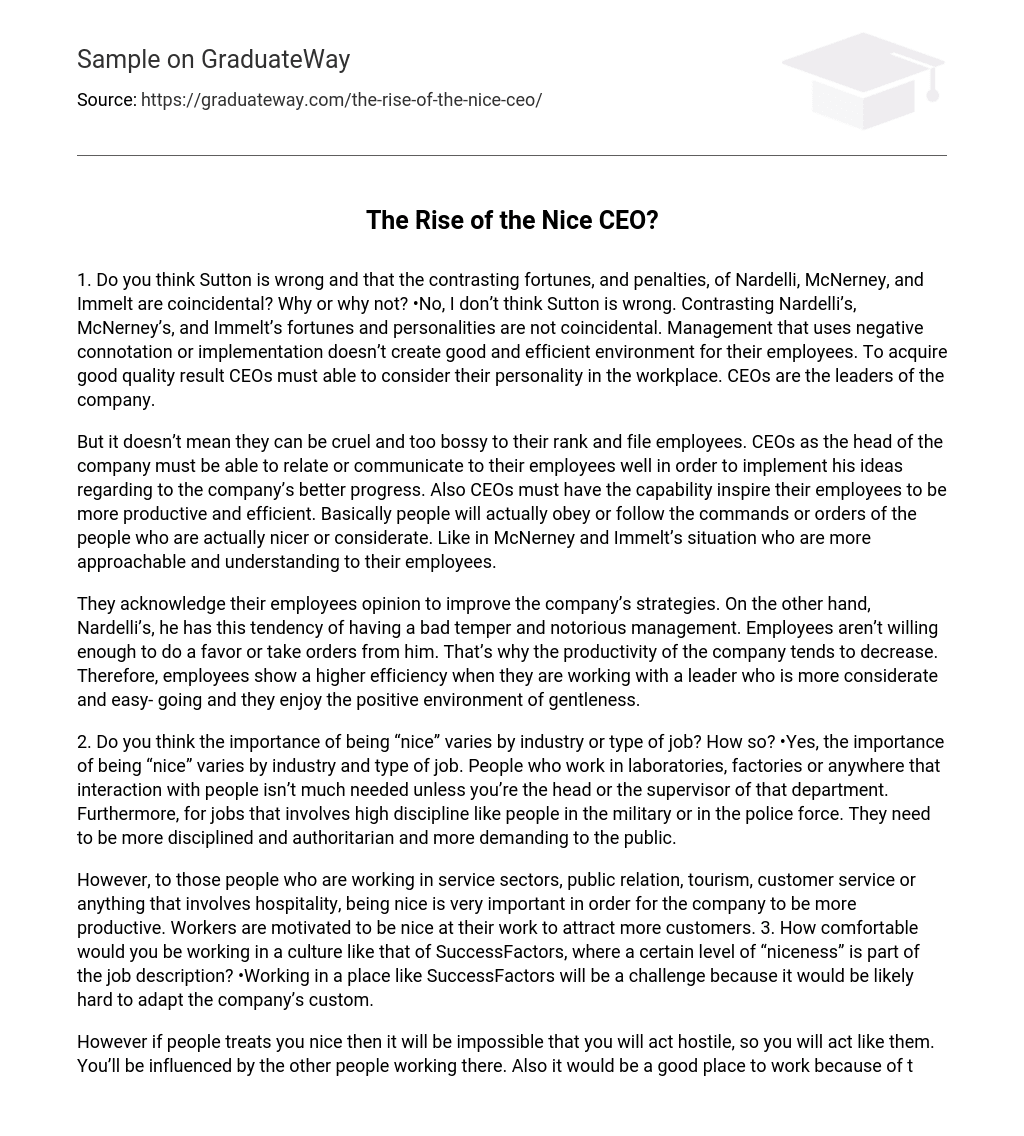1. Do you think Sutton is wrong and that the contrasting fortunes, and penalties, of Nardelli, McNerney, and Immelt are coincidental? Why or why not? •No, I don’t think Sutton is wrong. Contrasting Nardelli’s, McNerney’s, and Immelt’s fortunes and personalities are not coincidental. Management that uses negative connotation or implementation doesn’t create good and efficient environment for their employees. To acquire good quality result CEOs must able to consider their personality in the workplace. CEOs are the leaders of the company.
But it doesn’t mean they can be cruel and too bossy to their rank and file employees. CEOs as the head of the company must be able to relate or communicate to their employees well in order to implement his ideas regarding to the company’s better progress. Also CEOs must have the capability inspire their employees to be more productive and efficient. Basically people will actually obey or follow the commands or orders of the people who are actually nicer or considerate. Like in McNerney and Immelt’s situation who are more approachable and understanding to their employees.
They acknowledge their employees opinion to improve the company’s strategies. On the other hand, Nardelli’s, he has this tendency of having a bad temper and notorious management. Employees aren’t willing enough to do a favor or take orders from him. That’s why the productivity of the company tends to decrease. Therefore, employees show a higher efficiency when they are working with a leader who is more considerate and easy- going and they enjoy the positive environment of gentleness.
2. Do you think the importance of being “nice” varies by industry or type of job? How so? •Yes, the importance of being “nice” varies by industry and type of job. People who work in laboratories, factories or anywhere that interaction with people isn’t much needed unless you’re the head or the supervisor of that department. Furthermore, for jobs that involves high discipline like people in the military or in the police force. They need to be more disciplined and authoritarian and more demanding to the public.
However, to those people who are working in service sectors, public relation, tourism, customer service or anything that involves hospitality, being nice is very important in order for the company to be more productive. Workers are motivated to be nice at their work to attract more customers. 3. How comfortable would you be working in a culture like that of SuccessFactors, where a certain level of “niceness” is part of the job description? •Working in a place like SuccessFactors will be a challenge because it would be likely hard to adapt the company’s custom.
However if people treats you nice then it will be impossible that you will act hostile, so you will act like them. You’ll be influenced by the other people working there. Also it would be a good place to work because of the environment that will be implemented in there. People will be in there are nicer because a certain level of “niceness” was included as a part of the job description. Then people who will be hired in that company will be less to yell or be yelled. The work place will be filled with positive vibes whereas employees will actually enjoy and be motivated to work.
I think it would be comfortable working in this kind of company with this kind of culture. 4. Do you think being “nice” is the same as the Big Five trait of agreeableness? If so, do you think companies should screen out those who score low on agreeableness? •For my own opinion, Yes, though agreeableness means to refer “an individual’s propensity to defer to others. ” So it means that people who got high score are nice, cooperative, and trusting. But I’m not actually in favor of people undergoing such screening for those people who got low scores on agreeableness.
Basically because not all people are a like to each other. No different individual possess same talents, abilities, intelligences, strengths, weaknesses, and even experiences. One might be weaker in this aspect but when it comes to other things he or she appears stronger compare to other. What I’m trying to say is that, people who get low scores might be more critical in decision making or more determined compared to others. 5. Earlier we discussed the fact that entrepreneurs score significantly lower than managers on agreeableness.
How would you reconcile this finding with Sutton’s point? •Entrepreneurs score significantly lower than managers on agreeableness because they work as an individual. They basically don’t have to work under someone’s management or with too many employees. They ordinarily own small businesses and actually they are the investors of these businesses. They are the one who decides for themselves they don’t have to consult or compromise with other people. Sutton mentioned that getting along or being nice to others is important because it is the key to the company’s organization.
Given that entrepreneurs are working independently they don’t have to get along unless it is to their clients, which actually they have to agree sometimes. Unlike managers who interact, communicate who lead group of employees to strategize and monitor them while they are doing their tasks. Therefore entrepreneurs score lower because they work as an individual, independently. Then managers have higher score because of the fact that they have to get along with their subordinates in order to come up with good ideas and to be more efficient as a group not as individuals.





